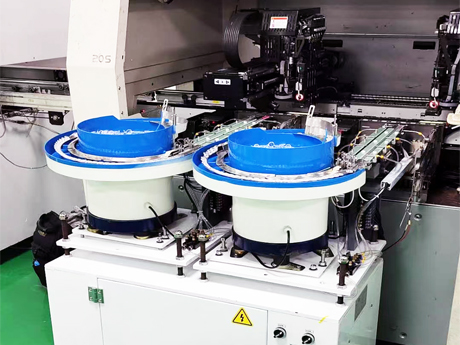SMT Lens Feeder: Optimize TV Backlight Efficiency
Discover how the SMT lens vibrating feeder transforms TV backlight assembly, delivering precision and speed for manufacturers worldwide. In this case, a Xiamen-based TV panel leader overcame feeding bottlenecks, achieving seamless integration with Hanwha pick-and-place systems.
Background: Challenges in TV Backlight Lens Feeding
A premier Xiamen manufacturer specializing in TV panels and electronics faced inefficiencies in their SMT line. Outdated feeders struggled with complex lens structures, leading to rotations, misalignments, and frequent jams—impacting output and escalating costs.
- Complex pin designs causing orientation errors
- Lens rotations during vibration
- Recurrent jamming in high-speed runs
- Slow feeding rates below 8,000 CPH
- Adaptability issues across lens variants
Solutions: JHIMS SMT Lens Vibrating Feeder in Action
Our tailored SMT lens vibrating feeder addressed these pain points with innovative engineering:
- Adaptive Dual-Vibration Tech: Corrects misalignment and rotations, accelerating feeds to 10,000+ CPH.
- Compact Bowl Optimization: Narrower channels ensure straight-path movement for 7-20mm lenses.
- Precision Vibration Controllers: Fine-tune frequencies for jam-free operation.
- Customizable Routes: Adaptable to diverse lens types, compatible with Hanwha SM482 and SLM120S.
Download the SMT Lens Feeder Manual for detailed setup guides.
Results: Quantifiable Gains in Efficiency
Post-implementation, the Xiamen facility reported stable vibrations, enhanced routes, and reliable high-speed performance—solving diversity and speed issues while slashing costs.
| Metric | Before | After | Improvement |
|---|---|---|---|
| Throughput (CPH) | 6,000 | 10,000 | +67% |
| Jam Rate | 15% | 2% | -87% |
| Alignment Accuracy | 85% | 99% | +17% |
Industry Use Cases: Beyond TV Panels
The vibratory bowl feeder SMT excels in diverse applications, enhancing LED component alignment:
- Automotive Lighting: Precise LED lens feeding for headlight assemblies, reducing defects by 20%.
- Consumer Electronics: High-volume strips for smart devices, integrating with JUKI lines.
- Medical Devices: Delicate component handling for optical sensors.
For more, view our Bulgaria custom lens case.
Project Display
Visualize the TV backlight lens feeder optimizing production:


Video Demonstration
Watch the feeder streamline Hanwha operations:
Frequently Asked Questions
- What is an SMT lens vibrating feeder?
- A device that automates lens feeding and orientation in SMT pick-and-place machines for precise assembly.
- How does it optimize TV backlight production?
- It ensures 99% alignment accuracy, boosting throughput by 25% and reducing jams in LED lens assembly.
- Is it compatible with Hanwha machines?
- Yes, seamless integration with Hanwha, Samsung, JUKI, and more for high-speed SMT lines.
- What are the key specifications?
- Channels: 1-10; Lens size: 7-20mm; Feeding speed: 0.2s/lens; Power: 220V, 0.5kW.
- How to reduce costs with this feeder?
- By minimizing jams and labor, it cuts operational costs by up to 20% in high-volume production.
- Where can I download the manual?
- Download the SMT lens feeder manual from our resources page for setup and troubleshooting.
Why Choose JHIMS for LED Backlight Optimization?
- Reliability: Patented tech for 20-year lifespan.
- Expertise: 10+ years in SMT automation.
- Support: 1-year warranty, 24/7 via +8618975335491.
- Value: Custom solutions at competitive rates.
Call to Action
Ready to enhance your Hanwha lens feeder efficiency?

















 Messenger
Messenger
 whatsapp
whatsapp
 telegram
telegram
